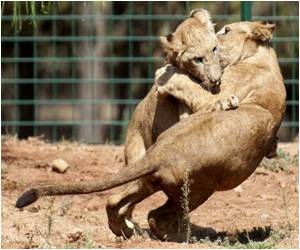A report has said that nearly half of Africa's wild lion populations may decline to near extinction over the next 20-40 years without urgent conservation measures.

The report has been led by the University of Minnesota's Professor Craig Packer and co-authored by a large team of lion biologists, including Panthera's President, Dr. Luke Hunter, and Lion Program Director, Dr. Guy Balme.
"It is clear that fences work and unfenced populations are extremely expensive to maintain," said Craig Packer, who also sits on Panthera's Cat Advisory Council.
The report showed that conservation costs are lower, and lion population sizes and densities are greater, in reserves secured by wildlife-proof fences, compared to unfenced ecosystems.
Lions in unfenced reserves were subject to a higher degree of threats from human communities, including retaliatory killing by herders, habitat loss and fragmentation, and overhunting of lion prey, the report added.
Advertisement
According to the report, at present, it is estimated that fewer than 30,000 lions remain in Africa in just 25 percent of the species' original natural habitat.
Advertisement









